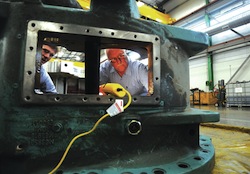The future Wilton E. Scott Institute for Energy Innovation is one step closer to reality today at Carnegie Mellon University with the official groundbreaking ceremony. The center will be focused on research and education to improve energy efficiency and develop clean energy sources. The institute was made possible by a lead gift from CMU alumni Sherman Scott (E’66), president and founder of Delmar Systems, and his wife, Joyce Bowie Scott (A’65), a trustee of the university. The institute is named for Sherman’s father, Wilton E. Scott.
 A report recently issued by the Allegheny Conference on Community Development highlighted the need for energy-related workers before the end of this decade. One goal of institute will be to develop new innovative energy technologies and create an improved understanding of how to promote wide adoption through better regulation and public policy.
A report recently issued by the Allegheny Conference on Community Development highlighted the need for energy-related workers before the end of this decade. One goal of institute will be to develop new innovative energy technologies and create an improved understanding of how to promote wide adoption through better regulation and public policy.
“The Scott Institute is a university-wide effort that brings together more than 100 CMU professors and researchers to solve some of our toughest energy challenges,” said CMU President Jared L. Cohon. “I thank Sherman and Joyce Bowie Scott not only for their generous gift, but also for their vision in helping to create this institute. They realize the fundamental importance of developing sustainable energy solutions for America and the world.”
The institute will support teams of CMU engineers, scientists, economists, architects, policy specialists and others who will collboratively tackle a range of issues, including developing more efficient energy solutions that reduce carbon emissions; smart grid technology to enable the use of large amounts of variable wind and solar power; and new advanced materials and processes to produce and store energy, increase efficiency and reduce waste.
Sherman Scott, who built Delmar Systems into a leader in mooring systems for the offshore oil and gas industry, added, “By bringing together experts from a range of disciplines, Carnegie Mellon is the perfect place to help meet the energy challenges of the future. Energy is a precious resource, and Carnegie Mellon’s systems approach can create solutions that ensure we produce and use energy more efficiently.”











